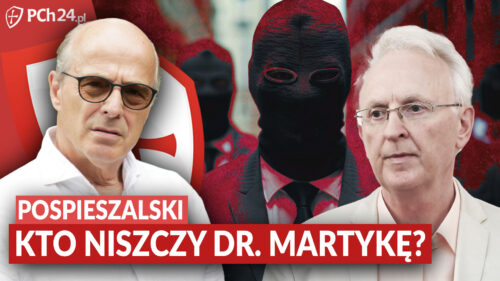A document of the Conference of Polish Bishops was already supposed to be presented last autumn. Its aim was to put in order the issue of pastoral family counseling, including the sacramental discipline related to e.g. administering Holy Communion to divorcees living in new relationships. However the bishops have not given any precise date of issuing the new instruction and haven’t reacted in any official way to an initiative of the lay faithful worried about the chaos and abuses in the interpretation of Church teaching.
The Polish Episcopate was working on their guidelines on marriage and family counseling, for example, during their two-day session in Zakopane in early June last year. The Conference of Polish Bishops representatives announced at that time that the document should be expected in its final form in autumn 2017.
Wesprzyj nas już teraz!
They talked about an instruction dealing with such topics as preparation for marriage, pastoral family and non-sacramental union counseling. Bishop Jan Wątroba, presiding at the team preparing the document, announced that the document would have several dozens of pages and that the Directory of Family Pastoral Counseling published in 2003 would not lose its validity. It allows persons living in non-sacramental unions to receive Holy Communion on unambiguously formulated conditions: the impossibility of separating due to e.g. bringing up children or the necessity of helping in the case of illness and advanced age; an unequivocal vow, confirmed in front of a priest, to refrain from any sexual intercourse; repairing any possible harm and injustice committed in any previous relationships; avoiding scandal. The Directory recommended receiving Holy Communion outside the environment of one’s parish.
At the June CPB meeting Bishop Wątroba emphasized that there had not been any change in Church doctrine regarding receiving Holy Communion by persons living in non-sacramental unions. Sanctifying grace is a condition to approach the Lord’s Table. The recently extremely popular “discernment” is supposed to consist of making sure that the previous sacramental union was entered into in a valid way. However, there was no mention that the confession of one of the sides might exempt them from fidelity to their sacramental spouse. The hierarch pointed out that any conversation with a priest might only lead to referring the matter to a Church court which has the right to pass a binding verdict whether that particular marriage actually took place at the moment when it was formally entered into.
Archbishop Henryk Hoser also pointed out that there is no modification of the sacramental discipline but only “a pastoral approach to those people who often long for full communion with the Church and cannot always fulfill it”.
Ad calendas graecas…
In the middle of October the Polish Episcopate gathered again. There was no promulgation of the previously announced guidelines concerning sacramental and pastoral practices. A customary press release from the session of the Conference of Polish Bishops included only a short mention of that issue: “The bishops continued their work on documents concerning pastoral marriage and family counseling. They stressed the necessity of accompanying marriages and families at all stages of life. They at the same time would like to thank those priests, people living consecrated lives and faithful laypeople who everyday serve in helping in the fulfillment of family tasks and targets”.
In the middle of June 2018 the Father Piotr Skarga Institute launched its internet action “Polonia Semper Fidelis,” which was an initiative of support for Polish bishops and encouragement to them to confirm that the Church in our country remains faithful to the teaching of Christ about the indissolubility of marriage. Prior to this, people corresponding with the Institute could attach their signatures to the appeal in a traditional way by sending a letter via regular mail. Among the signatories, there were many well-known public figures, including scientists, artists and journalists.
On March 5th at the seat of the Conference of Polish Bishops letters with the signatures of over 145,000 people supporting the Polonia Semper Fidelis initiative were delivered to Father Przemysław Drąg. The date was not accidental. Another plenary session of the Conference of Polish Bishops was scheduled to be held a few days later. In its summary there were a few sentences dedicated to the family and the exhortation Amoris Laetitia. However, the hierarchs neither adopted a stance – even though there were some questions asked during the press conference – on the action of the lay faithful, nor declared at least an approximate date of publishing the long-awaited instruction.
As early as April the spokesman of the Episcopate was again asked the following question: “Because of the enormous interest that the faithful have in the Polonia Semper Fidelis initiative and also because of the recently launched action of the “Families’ Doubts” Letter, we would like to ask our bishops a question of whether they would be willing to take a stance on the serious problems expressed therein concerning the administering of the holy sacraments. Is it known when the document will be published that has been under preparation for many months by the Conference of Polish Bishops concerning the exhortation Amoris Laetitia?”
The answer the PCh24 website received from the Press Office of the Episcopate was: “… it is not known when the document of the Conference of Polish Bishops will be ready. Should there be any information on this issue, it will be published on the following website: www.episkopat.pl”.
We don’t know even an approximate date for the announcement of their stance, which is being anticipated by so many faithful both in Poland and abroad. It is the hierarchs in Poland who stood up for the traditional teaching of the Church about marriage during the two memorable synods on the family. A confirmation of that stand, especially in the face of pressure put on the Episcopate from outside of Poland, would give some hope to Catholics of obviating the enormous chaos created by admitting adulterers (persons living as if they were married with their new partners despite having a previous Church wedding) to Holy Communion by some dioceses (e.g. in Germany, the USA and in Malta).
“Marriage is insoluble but…”?
The silence of the Polish bishops has become part of a wider context. Several days before the above mentioned October session of the Conference of Polish Bishops the National Catholic Register website published an interview with Gerhard Mueller, the previous Prefect of the Congregation of the Doctrine of the Faith dismissed by Pope Francis. The hierarch didn’t deny the suggestion expressed during that conversation that the Pope had been more willing to consult such personalities as Archbishop Victor Manuel Fernández, the rector of the Pontifical Catholic University of Argentina (considered to be the real author of AL) than the Congregation itself. While at the same time he directly admitted that some of the corrections to the document proposed by the CDF had been ignored by Pope Francis.
However, that’s not all. What the previous Prefect said was nothing less than the fact that just as with the Roman Curia, any critical remarks or doubts about the Pope’s exhortation at departments of theology were punished by expelling the “non-believer” from university.
At the beginning of 2018 a real doctrinal “bomb” went off. Catholic websites revealed that Pope Francis had given official status of the Church Magisterium to his letter from September 5th, 2016 to Bishop Sergio Alfredo Fenoya, a delegate of the Buenos Aires region of the Conference of Argentinean Bishops and also to the criteria of applying famous chapter VIII of Amoris Laetitia as expressed by bishops from the same region (also with the same date of September 5, 2016).
The Buenos Aires Bishops’ directives interpreted the above mentioned fragment of the Pope’s apostolic exhortation as opening a possibility of receiving Holy Communion “in certain cases” by people remaining in new unions without an obligation to live in chastity.
“The document is very good and completely explains the meaning of chapter VIII of Amoris Laetitia” – the Pope wrote. – “There are no other interpretations” – he added.
As we know Church documents to gain a status of Magisterium must remain in conformity with the previous teaching of the Holy See. The “Argentinean” interpretation does not meet this condition. As only isolated hierarchs have spoken in defense – and a true defense not one that is only half-hearted – of the indissolubility of marriage, it only remains for Catholics to wait for some formal correction of the errors in the liberal interpretation of Amoris Laetitia.
Roman Motoła

















